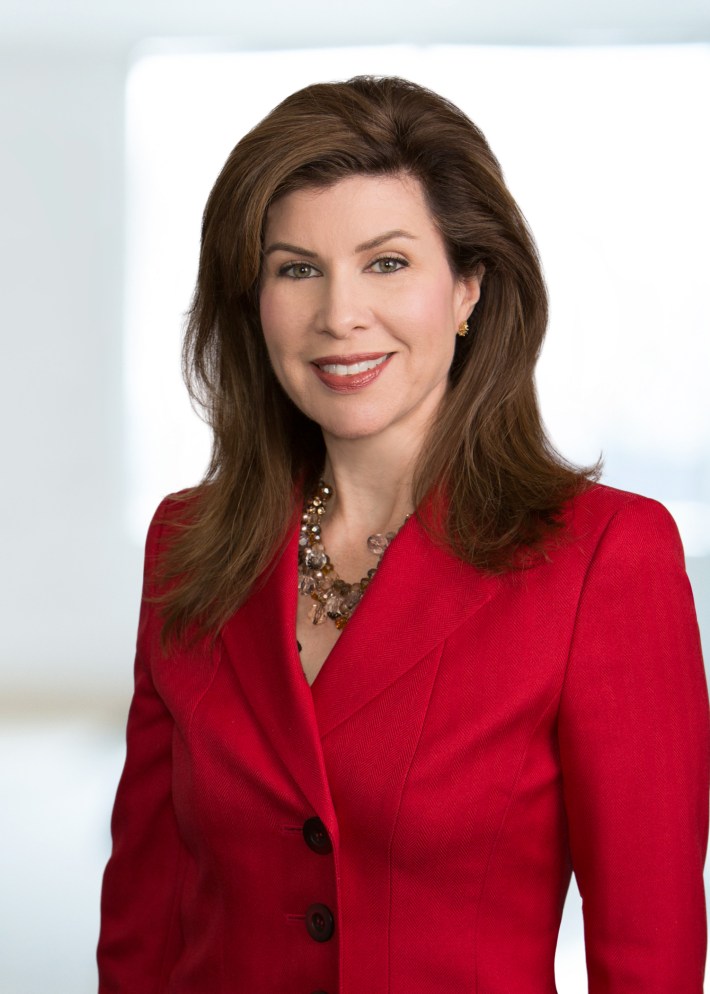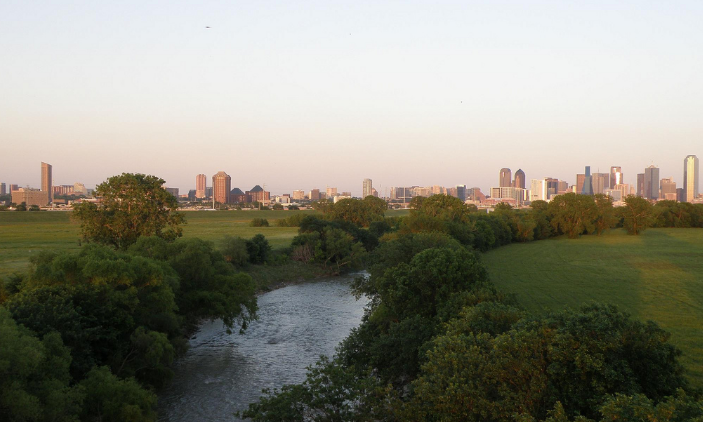Stopping a highway project is never easy. Plenty of vested interests stand to make a lot of money from planning, building, and financing the road. Once public officials decide they want to plow ahead, it can be hard to stop the momentum.

It's even harder when the highway is in a city like Dallas.
And yet this week, the Dallas City Council pulled the plug on the $1.7 billion Trinity Toll Road in a 13-2 vote. They want the city to focus its attention on building a new park along the riverfront.
A key figure in the highway revolt is former City Council member Angela Hunt. Without her work, Dallas might instead be locking in a six-lane barrier between downtown and the Trinity River floodplain and forest -- a 10,000-acre natural expanse in the heart of the city.
We called up Hunt to talk about her 11-year campaign, the setbacks she overcame, and how she built momentum against the highway over the years. It's a great story for anyone fighting a road project cutting across your neighborhood or city. The interview has been lightly edited.
How long have you been working on this?
I was the youngest woman ever elected to the City Council. I was a baby, I was 33. So I got on the council, it was 2005, and I wanted to learn everything I could, especially about the larger issues. One of them was the Trinity River Corridor Project. It was a massive project proposed to voters back in 1998.
My husband and I were just moving to Dallas [in 1998] and we missed that vote. I tried to educate myself and learn as much as I could. And one of the first things I did, my husband and I, is take a bike ride down into the Trinity. The Trinity is several thousands of acres of green space just on the edge of our downtown.
In the early part of the last century, our natural river, the Trinity River, was rerouted and channelized to provide flood protection, after some massive flooding had destroyed parts of Dallas. That relocation ended up creating green space that’s protected by levies.
So my husband and I pre-kids rode our bikes down there. There are bridges across the Trinity River but it's not easily accessible to get down into the floodway. So we got our bikes over these 40-foot-high levies and went down into the floodway and it was just incredible. It was like discovering this secret natural area in the heart of a large urban city. Just driving over it does not have the same impact as standing within these thousands of acres of green space that are undisturbed.
It made a real impression on me to see this beautiful natural area and then see the Dallas skyline up above the tops of the levies. It changed the way I looked at the Trinity.
I wanted to learn more about the project, and I discovered the biggest aspect was actually a high-speed toll road planned to be put between the levies. That to me seemed like a project that would ruin the opportunity to create a beautiful natural park, and further redevelop the park with trails and other amenities that would take advantage of the natural setting.
And the more I learned about the project, the worse it became. It was truly a massive structure. It mimicked the transportation lines of two other major highways that provide a noose around our downtown. The traffic numbers that were projected did not justify the expense of the road. The road was around $1.7 billion. And it had been discussed originally as a low-speed road. As something more modest. And it had become just a massive project with huge flyovers, no park access, high speeds.
The more I learned, the more I realized that we needed to get rid of the toll road in order to realize the potential of the park, and more importantly to not destroy this park land.
So you led an initiative to bring it to the ballot.
I initially tried to convince my council colleagues to vote on it and to remove the toll road. "Let's move forward on the park. That's what everyone's excited about." But I couldn't get any traction on it.
I want to be clear, the 1998 ballot measure that financed the Trinity Corridor Project was three components. It was a park, it was flood control, and it was something called the Trinity River Parkway. I think when most people think of a parkway, they think of a fairly gentle meandering parkway that's low-speed.
It was important to us in 2007 to change the nomenclature to make it clear that this is not in any way a parkway, this is a toll road. We really changed the words people used, and it made educating about the project a lot easier.
So now it's really known as the Trinity Toll Road, which is more accurate, more apt.
Our side never, ever referred to it as a parkway. Slowly and surely the media started referring to it as a toll road. Then everybody started referring to it as the Trinity Toll Road.
Words are important.
So about the referendum...
The only real way to do away with it, if the council wasn't going to address it, was a referendum.
Every elected official besides me and one state rep were against us. The entire City Council, the mayor, the business community, a congressman, one U.S. senator, I mean everybody was opposed. And yet, we were focused on bringing the facts about this road, such as its lack of real mobility. This was 1950s-style infrastructure that we were proposing to put in in the 21st century, when cities around the country and around the world were removing roads from their riverfronts, and here we were about to invest in one to the tune of almost $2 billion.
It just didn't make any sense.
We were unsuccessful [in the referendum]. We were close but we were tremendously outspent. The other side didn't really have a problem in making statements that were just untrue.
They said other major projects are dependent on the Trinity Toll Road. "If we don't do the Trinity Toll Road, we can't do other major highways in downtown." That was untrue. And it's been proven untrue, because those projects have moved forward in the last few years.
They also made statements like, "The Trinity Toll Road's paid for. We have buckets of money." There's more than a billion gap in funding, so there's not funding for the project.
And the final one that I think was most challenging to us was all the other elected officials were saying, "Look, if we eliminate the toll road, the entire project will unravel and we won't get to do the park."
None of that was true, either, because not a single dime of the park was funded in relationship to the toll road.
We were up against a lot of misinformation and lies and yet we got more than 47 percent of the vote.
You had to make this an issue in City Council races, and City Council had to flip?
Yes, that's exactly right.
So we looked at council races. I created a PAC, a political action committee, to support candidates who opposed the toll road. In our last election two years ago we were successful in getting a couple of additional folks on the council, replacing candidates who'd been pro toll road.
It created a narrow majority. Once that was clear, we were able to move forward and get the vote and it ended up being 13-2 vote to kill the toll road.
So I spent from '07 until now working to kill the toll road.
It culminated [Wednesday], and a lot of other people have worked on it.
That's where we are, we can finally move forward on the park.






